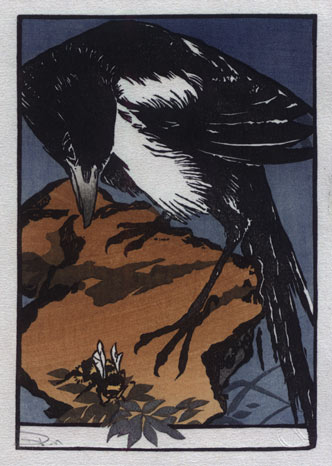![]() Hanga Treasure Chest: Print #14
Hanga Treasure Chest: Print #14
![]()
![]()

|
||
Magpie and Bee
So how well are you doing at the little game of predicting what is coming up next in this Treasure Chest series? Are you confused by what may seem to be a 'random' group of prints, or are you enjoying the 'eclectic' selection?
For the first (but not last) time in this set, we have a design by a non-Japanese artist. Dating from about 1910, this is the work of Jules Chadel, a member of 'Les Amis de l'Art Japonais', a group of French artists active around the turn of the previous century, a time when Japanese art was having an enormous influence on European design.
That influence is well-known and documented, but for the most part, the effects were on the content of the art produced. There were though, a few artists influenced also by the Japanese techniques, and Chadel was one of these. The colours on this print of his were water-based pigments applied to the wood with a brush, in contrast to the oil-based inks used for most western wood-block work. I have no idea how he learned the methods of doing this; perhaps he had some contact with the group of English printmakers who were learning from the Japanese expatriate Yoshijiro Urushibara at about this time, or perhaps he was a private experimenter, studying and learning from the Japanese prints that were flooding Europe just then.
It is a fact of quite some sadness for me that these experiments by European artists did not result in the water-based printmaking technology becoming firmly established in the west. The English did more with it than others, but they too gave it up in favour of the oil-based methods.
I myself believe that one of the main reasons for this is that until one has accumulated a lot of experience, it can be difficult to produce consistent results - large batches of identical prints - with the Japanese technique, something fairly straightforward when using oil-based inks and a press.
Looking at the bright side though, I guess this is one of the main reasons why I don't have much 'competition'!
David